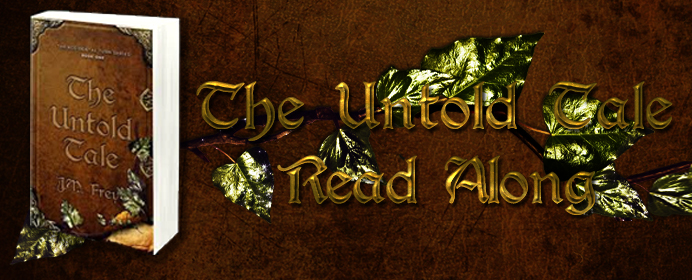
Welcome to The Untold Tale read-along! The Untold Tale by J.M. Frey is the first book in the Accidental Turn series, the second book of which, The Forgotten Tale, will be released on December 6th. To prep for book two, we’re sharing a ten-part series that will be part recap, part review, and part discussion of the book that has been called the “most important work of fantasy written in 2015.”
If you want to read along with us and avoid the SPOILERS that will follow, you can pick up your copy of The Untold Tale from major online retailers, or snag a free copy from StoryCartel.
About the book
Forsyth Turn is not a hero. Lordling of Turn Hall and Lysse Chipping, yes. Spymaster for the king, certainly. But hero? That’s his older brother’s job, and Kintyre Turn is nothing if not legendary. However, when a raid on the kingdom’s worst criminal results in the rescue of a bafflingly blunt woman, oddly named and even more oddly mannered, Forsyth finds his quaint, sedentary life is turned on its head.
Dragged reluctantly into a quest he never expected, and fighting villains that even his brother has never managed to best, Forsyth is forced to confront his own self-shame and the demons that come with always being second-best. And, more than that, when he finally realizes where Lucy came from and why she’s here, he’ll be forced to question not only his place in the world, but the very meaning of his own existence.
Smartly crafted, The Untold Tale gives agency to the unlikeliest of heroes: the silenced, the marginalized, and the overlooked. It asks what it really means to be a fan when the worlds you love don’t resemble the world you live in, celebrates the power of the written word, challenges tropes, and shows us what happens when someone stands up and refuses to remain a secondary character in their own life.
Part One: Chapters 1 and 2
In this section, we’re introduced to our narrator Forsyth Turn, lord of a rural fiefdom by day, King’s Shadow Hand by night, as he receives the unexpected delivery of a grievously injured person. That person turns out to be a victim of the evil Viceroy, the biggest bad in the kingdom of Hain, and his lackey Bootknife, whose preferred method of torture is carving designs into people’s backs.
But Lucy Piper, aka Pip, outlasted her captors, resisting their interrogation longer (and gaining a more elaborate scar) than anyone Forsyth has ever heard of. Between that and the fact that nothing about her points to any family or country he knows–and as the Shadow Hand, he knows just about everything–Forsyth finds himself engrossed by his impressive and mysterious guest.
Given the scant clues he is able to discern about Pip and the conditions of her imprisonment, Forsyth begins to consider that she may be more than human; that she is, in fact, a mythical Reader. Far from being an answer, this possibility only raises more questions.
“I am upstairs when I catch sight of the approaching cart.”
The opening line is in present tense, but it reminds me of a recollection anyway–someone remembering the moment everything in their life changed. And that’s exactly what this is for Forsyth Turn, the moment an unconscious Lucy Piper is brought to his manor.
The first pages of this book are excellent in so many ways, establishing expectations for the narrator (he assumes the body in the cart is a corpse–me too, man, me too) and for the story. Frey doesn’t give us the suspense of the raid during which Pip was rescued, she gives us the reflection that comes after, the care and the follow-through. She doesn’t give us the point of view of the guy who kicked down the Viceroy’s door and saw an unexpected prisoner; she gives us the man who quietly arranged and ordered simultaneous–and successful–sneak attacks on numerous enemy hideouts.
This first section of the book is primarily an introduction of Forsyth, our unusual narrator. He is intelligent, stable, composed; at least, when he’s going about his duties. As the master of his house, he efficiently handles the sudden appearance of a woman in great need of comfort and medical care. We can infer his similar competence as Shadow Hand by the fact that the men he trains and commands didn’t know they were going to find Pip on the raid and still managed to get her out alive, along with the books that were their target, without any loss of life or other catastrophe in the operation. And as a Lordling, it’s impossible to not be reminded of Mr. Darcy; we get the first hint of Forsyth’s goodness as a landlord in the discussion of the generous and improved usage of the Law Manor, both for his friend Sheriff Pointe specifically and the Chipping (the land under his protection) as a whole.
In all these instances, Forsyth seems sure of himself. But the moment the focus goes from his obligations, to his own self and happiness, he is uncomfortable at best and violently self-deprecating at worst. I can’t remember the last time I’ve seen this in a male protagonist, if ever, and yet there are men in my own social circle and probably beyond who struggle with this same odd balance of competency and anxiety. His first instinct is to see the lack in himself, and he assumes that all but a select few see exactly what he sees: his uselessness and failings.
What seems to unify the areas in which Forsyth is confident is their distance from himself–the Shadow Hand is literally a “personality [he wears], a costume [he] conceived” (p 22), and the role of Lordling is one that he was obligated to take up due to the neglect of his elder brother Kintyre, the rightful lord.
Though Forsyth is a man who has seemingly resigned himself to loneliness, he is marvelously sensitive. The man has Feels; he’s crushing on Pip from the get go, clear to the reader long before Sheriff Pointe jokes about Forsyth courting her. He is sentimental and sincere in his tenderness and his obligations to protect her, though she is a stranger. The significance he attaches to Pip’s trust, the naivety with which he accepts it, is perhaps a tad over-the-top, but in that way it is an insight into Forsyth. It’s a sign of just how smitten he is that he’s not more suspicious of her.
Forsyth is a character who doesn’t know how great he is, and I have to admit, it’s nice to see that look on a male-identified character for once. I also enjoy the obviousness of the chemistry between him and Pip, as well as his total obliviousness to it–this is what great ships are made of, after all.
The Untold Tale has a slow start, action-wise, that’s true–chapters one and two, despite being more than fifty pages, are pretty much all about Pip’s early recovery and her and Forsyth getting to know each other a little. But the writing flows so well that the reading goes easily and quickly; it was almost hard to stop at page 53.
Coming Up
There’s a lot to look forward to in the next installment. Pip is an utter mystery, we’ve only just gotten teases of magic and mythology in this world, and big hero-man Kintyre Turn has been heavily talked up before the appearance we can expect soon.
Part two of the read-along will go live next Tuesday on C.M. Spivey’s blog, and cover pages 54-140 (chapters 3, 4, and 5).



